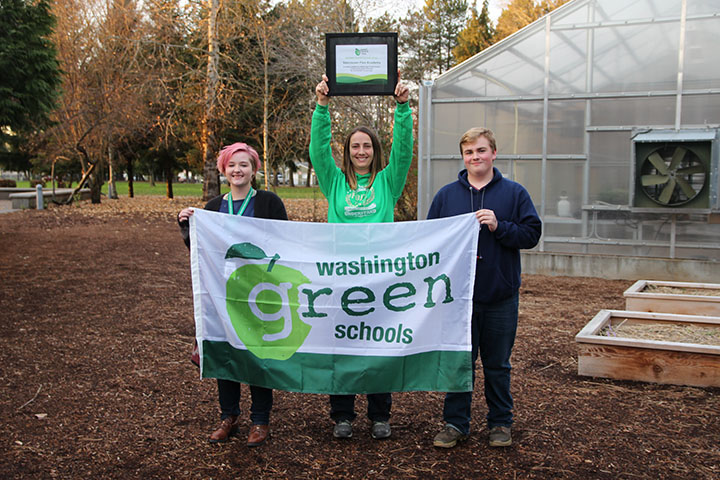First photo, from left: Student Nanni Tipton, teacher Angela Fojtik and student Noah Sweeney display their Washington Green Schools banner. Second photo: Student Alexa Attebery checks the progress of fava beans growing in one of the school’s raised garden beds. Third photo: Among the winter vegetables currently being grown at the school are fava beans (foreground) and garlic (back left corner). Straw laid over the dirt insulates the plants during the colder months.
Horticulture and natural resources classes leading the way
Visit Vancouver Flex Academy and you’ll notice that there’s something happening on the six-acre campus. Bark mulch has replaced the sod around the school’s two greenhouses. Raised garden beds are homes to vegetables growing from seed. And if you look closely, you’ll see that an automated drip irrigation system now efficiently delivers water to the 10 beds.
The transformation is nearly a year in the making. And students in Flex’s horticulture and natural resources classes and teacher Angela Fojtik are leading the way. They drafted a plan, with input from Principal Steve Lindblom and staff members, to grow fruits and vegetables and improve water use on school grounds. District staff removed the grass to make way for bark mulch. Steve Pagel, a professional landscaper, volunteered to lead the irrigation installation.
Classes plotted the layout last spring and laid in the planter boxes, sowing pumpkins, tomatoes and watermelons. This year, students are learning how to pickle vegetables and growing fava beans and garlic.
Plans for the gardens also extend to curriculum, with harvests being used to teach students how to compare, contrast and classify produce varieties.
Another important goal: Grow enough fresh fruits and vegetables to provide food boxes for low-income families. “I want to be able to help our community,” said junior Alexa Attebery, one of the students who initiated the project.
The progress was rewarded in December 2017, when the school received bronze certification in the school gardens and grounds category. The recognition was Flex Academy’s first from the nonprofit Washington Green Schools. Now the students are aiming even higher, said Fojtik, and setting their sights on reaching gold certification by the end of the school year.
“Completing the raised bed project was the initial stepping stone to transforming our campus grounds into a dynamic outdoor learning space,” Fojtik said. Plans for future projects include keeping mason bees.
Said Attebery, “We’re working really hard to accomplish this.”



